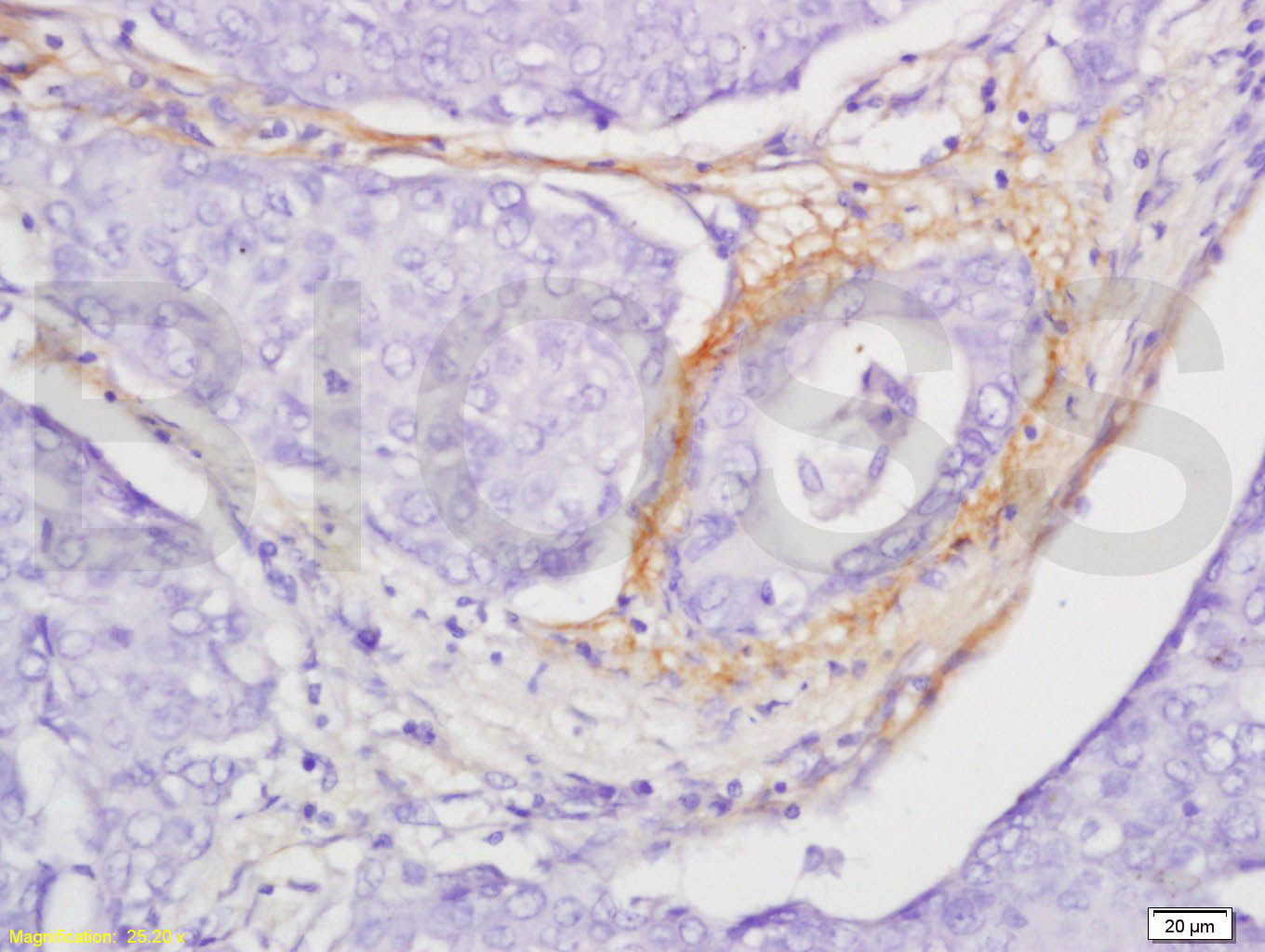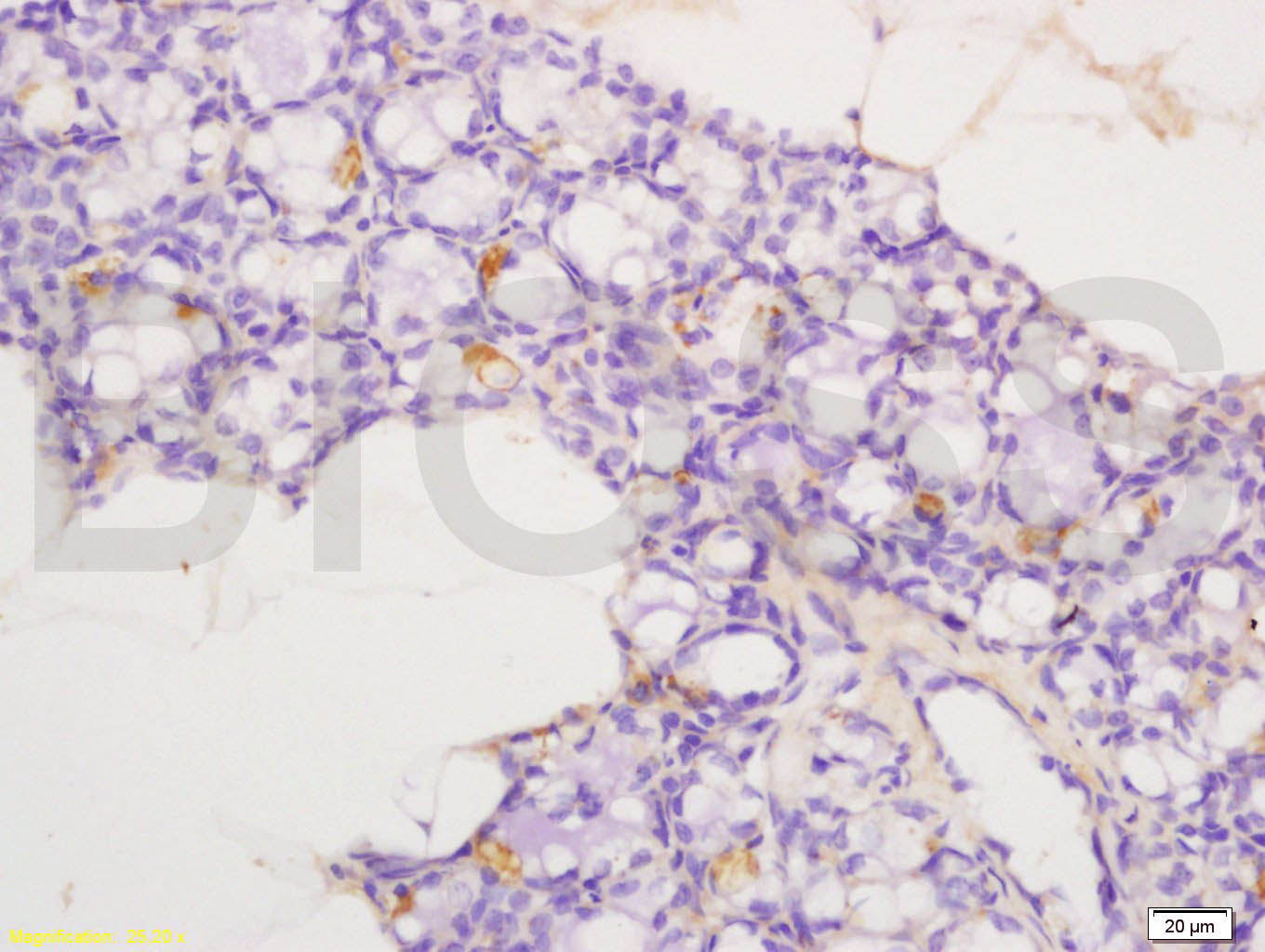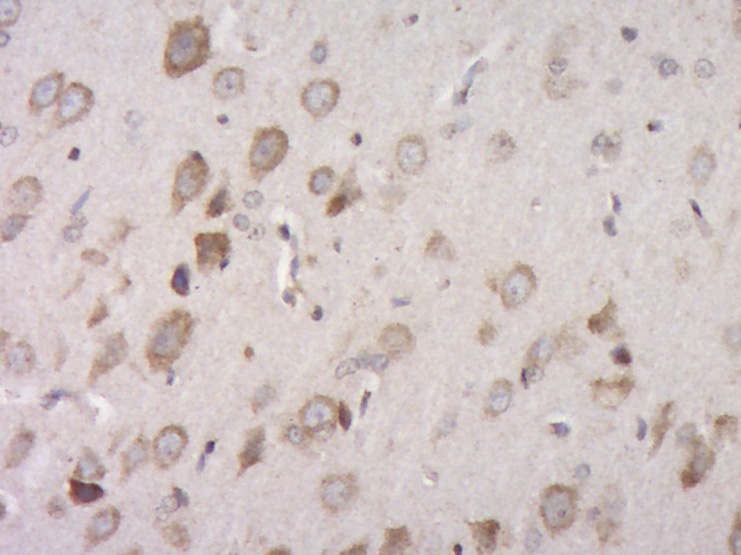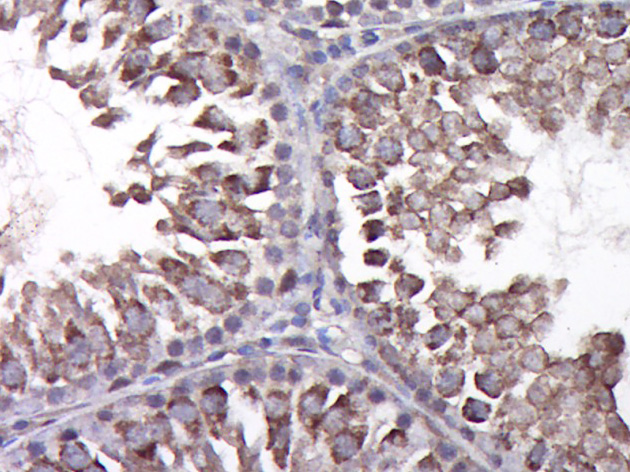CCL4 Rabbit pAb
CCL4 Rabbit pAb
- SPECIFICATION
- CITATIONS
- PROTOCOLS
- BACKGROUND

Application
| IHC-P, IHC-F, IF |
|---|---|
| Primary Accession | P14097 |
| Reactivity | Mouse |
| Host | Rabbit |
| Clonality | Polyclonal |
| Calculated MW | 7.8 KDa |
| Physical State | Liquid |
| Immunogen | KLH conjugated synthetic peptide derived from mouse MIP-1 beta |
| Epitope Specificity | 21-92/92 |
| Isotype | IgG |
| Purity | affinity purified by Protein A |
| Buffer | 0.01M TBS (pH7.4) with 1% BSA, 0.02% Proclin300 and 50% Glycerol. |
| SUBCELLULAR LOCATION | Secreted. |
| SIMILARITY | Belongs to the intercrine beta (chemokine CC) family. |
| SUBUNIT | Homodimer and heterodimer of MIP-1-alpha(4-69) and MIP-1-beta(3-69). |
| Post-translational modifications | N-terminal processed form MIP-1-beta(3-69) is produced by proteolytic cleavage after secretion from peripheral blood lymphocytes. |
| Important Note | This product as supplied is intended for research use only, not for use in human, therapeutic or diagnostic applications. |
| Background Descriptions | MIP1 alpha and MIP1 beta were originally co-purified from medium conditioned by an LPS-stimulated murine macrophage cell line. Human MIP1 beta refers to the products of several independently cloned cDNAs, including Act2, PAT 744, hH400, G26, HIMAP, HC21, and MAD 5a. The predicted protein products of these cDNAs represent variants that are between 94% - 98% identical and these proteins are all approximately 75% homologous to murine MIP1 beta. MIP1 beta also shares approximately 70% amino acid identity with MIP1 alpha. MIP1 proteins are expressed primarily in T cells, B cells, and monocytes after antigen or mitogen stimulation. The MIP1 proteins have chemoattractant and adhesive effects on lymphocytes, with MIP1 alpha and MIP1 beta preferentially attracting CD8+ and CD4+ T cells, respectively. A signal transducing receptor designated the CC chemokine receptor 1 (CC CKR1) with seven transmembrane domains that binds MIP1 alpha, MIP1 beta, MCP1 and RANTES with varying affinities has been isolated. |
| Gene ID | 20303 |
|---|---|
| Other Names | C-C motif chemokine 4, Immune activation protein 2, ACT-2, ACT2, Macrophage inflammatory protein 1-beta, MIP-1-beta, Protein H400, SIS-gamma, Small-inducible cytokine A4, Ccl4, Mip1b, Scya4 |
| Dilution | IHC-P=1:100-500,IHC-F=1:100-500,IF=1:100-500 |
| Storage | Store at -20 ℃ for one year. Avoid repeated freeze/thaw cycles. When reconstituted in sterile pH 7.4 0.01M PBS or diluent of antibody the antibody is stable for at least two weeks at 2-4 ℃. |
| Name | Ccl4 |
|---|---|
| Synonyms | Mip1b, Scya4 |
| Function | Monokine with inflammatory and chemokinetic properties. |
| Cellular Location | Secreted. |

Thousands of laboratories across the world have published research that depended on the performance of antibodies from Abcepta to advance their research. Check out links to articles that cite our products in major peer-reviewed journals, organized by research category.
info@abcepta.com, and receive a free "I Love Antibodies" mug.
Provided below are standard protocols that you may find useful for product applications.
Background
This product as supplied is intended for research use only, not for use in human, therapeutic or diagnostic applications.
If you have used an Abcepta product and would like to share how it has performed, please click on the "Submit Review" button and provide the requested information. Our staff will examine and post your review and contact you if needed.
If you have any additional inquiries please email technical services at tech@abcepta.com.













 Foundational characteristics of cancer include proliferation, angiogenesis, migration, evasion of apoptosis, and cellular immortality. Find key markers for these cellular processes and antibodies to detect them.
Foundational characteristics of cancer include proliferation, angiogenesis, migration, evasion of apoptosis, and cellular immortality. Find key markers for these cellular processes and antibodies to detect them. The SUMOplot™ Analysis Program predicts and scores sumoylation sites in your protein. SUMOylation is a post-translational modification involved in various cellular processes, such as nuclear-cytosolic transport, transcriptional regulation, apoptosis, protein stability, response to stress, and progression through the cell cycle.
The SUMOplot™ Analysis Program predicts and scores sumoylation sites in your protein. SUMOylation is a post-translational modification involved in various cellular processes, such as nuclear-cytosolic transport, transcriptional regulation, apoptosis, protein stability, response to stress, and progression through the cell cycle. The Autophagy Receptor Motif Plotter predicts and scores autophagy receptor binding sites in your protein. Identifying proteins connected to this pathway is critical to understanding the role of autophagy in physiological as well as pathological processes such as development, differentiation, neurodegenerative diseases, stress, infection, and cancer.
The Autophagy Receptor Motif Plotter predicts and scores autophagy receptor binding sites in your protein. Identifying proteins connected to this pathway is critical to understanding the role of autophagy in physiological as well as pathological processes such as development, differentiation, neurodegenerative diseases, stress, infection, and cancer.





